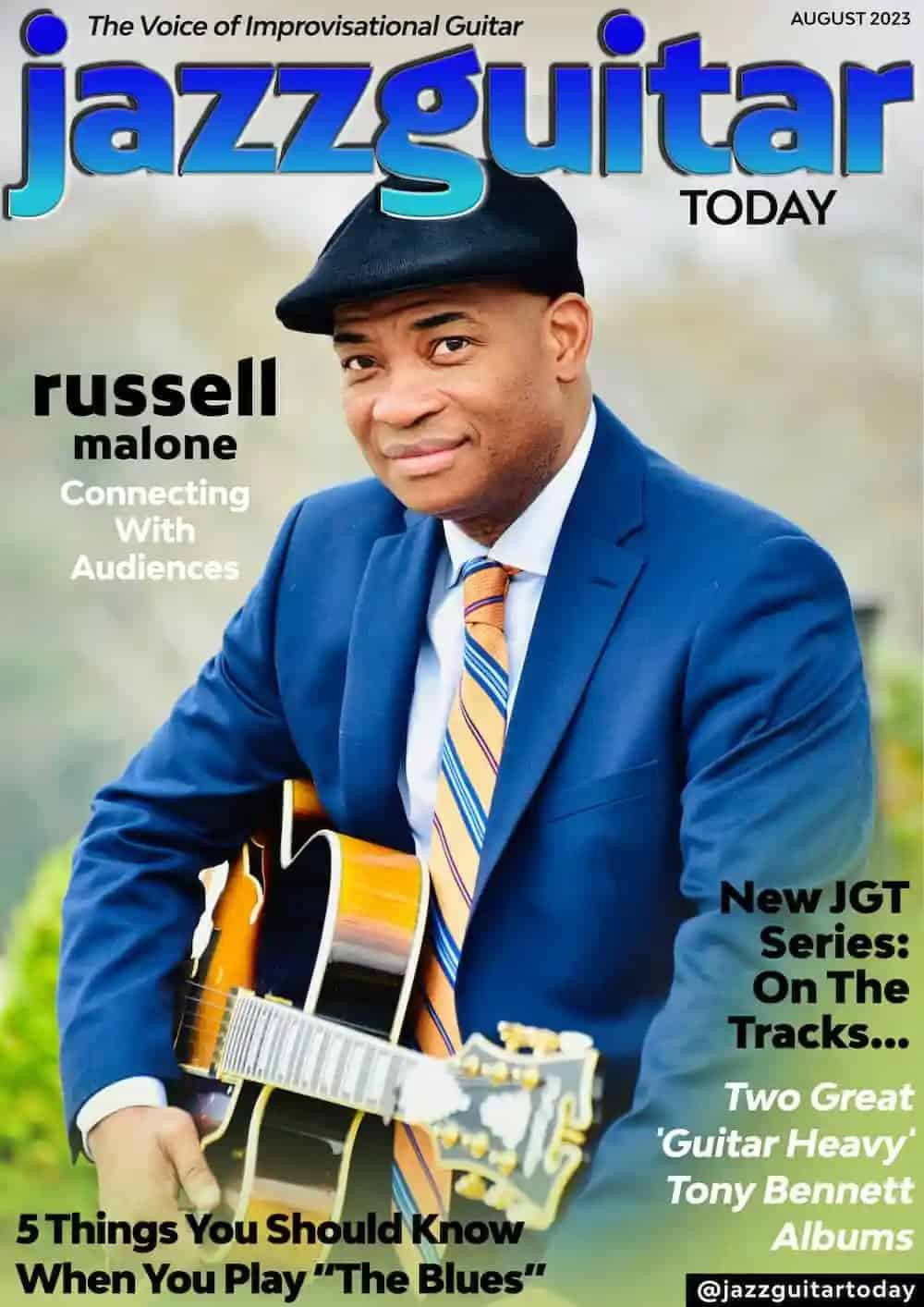The jazz world mourns the sudden passing of renowned guitarist Russell Malone, who died on August 23, 2024, at the age of 60. News of his death, reportedly due to a heart attack while on tour in Japan with bassist Ron Carter, has sent ripples of sadness throughout the music community. A self-taught virtuoso, Russell Malone Guitar playing captivated audiences and fellow musicians alike for decades.
 Russell Malone featured on the cover of Jazz Guitar Today magazine
Russell Malone featured on the cover of Jazz Guitar Today magazine
Born on November 8, 1963, in Albany, Georgia, Malone’s journey with the guitar began at the tender age of four when his mother gifted him a toy instrument. This early fascination blossomed into a lifelong passion at twelve, ignited by the inspiring performance of George Benson alongside Benny Goodman on television. Remarkably, Malone honed his exceptional skills independently, developing a distinctive voice on the instrument that would earn him widespread acclaim.
His professional career commenced in 1988, marking the start of a remarkable ascent through the jazz landscape. He initially toured with organ legend Jimmy Smith, an invaluable experience that showcased his talent to a broader audience. Following this, a three-year stint with Harry Connick Jr. further broadened his musical horizons before he joined Diana Krall’s ensemble in 1995, remaining her guitarist for approximately five years. From that point onward, Russell Malone became a fixture alongside an array of jazz luminaries, solidifying his status as one of the leading jazz guitarists of his generation.
Joe Barth, a contributor to Jazz Guitar Today, has compiled reflections from some of Russell Malone’s esteemed peers, offering a glimpse into the profound respect he commanded within the jazz guitar community.
Celebrated Rhythmic Approach and Swing
Bobby Broom immediately recognized Malone’s signature style, noting, “I could tell it was Russell by his rhythmic approach.” He elaborated on this defining characteristic, placing Malone alongside guitarists like Pat Martino and Wes Montgomery in terms of having a distinctive and recognizable sound rooted in “rhythmic choices.” Broom further highlighted Malone’s meticulous attention to articulation, a quality shared with Peter Bernstein and Mark Whitfield, particularly when playing melodies.
Mark Whitfield echoed this admiration for Malone’s rhythmic prowess, stating, “(On the bridge of “You Are the Sunshine of My Life” Russell is comping with a hard swing) I love to hear guitar players play rhythm.” He connected Malone to the legacy of Freddie Green, renowned for his rhythm guitar work in the Count Basie Orchestra, emphasizing Malone’s deep understanding of the rhythmic foundation in jazz guitar. Whitfield fondly recalled sharing the stage with Malone early in his career, underscoring the lasting impression Malone made from the outset.
Anthony Wilson also emphasized the infectious swing in Malone’s playing: “Swinging, it is so swinging. Russell is a very funny guy. He is the same on the guitar. When he starts to play it is always surprising.” Wilson’s words capture the joyful and unpredictable nature of Malone’s musicality, rooted in a deep sense of swing and rhythmic vitality.
Masterful Accompaniment and Solo Performances
Rod Fleeman, guitarist for Karrin Allyson, drew parallels between Malone and the legendary Joe Pass in their ability to accompany vocalists with sensitivity and creativity. “Russell is someone like Joe Pass. He is a great improviser, but he also has a deep bag in what he can do behind a solo singer.” Fleeman praised Malone’s “tasty and always relaxed” approach to accompaniment, highlighting his intuitive ability to provide the perfect musical support for a singer. He emphasized Malone’s chord voicings and harmonic movement, noting his innate sense of time and relaxed feel, akin to a “great piano player.”
John Pizzarelli lauded Malone’s versatility and deep musicality, stating, “I love Russell. He is a great student of the guitar. He’s got all the qualities of Joe Pass and Bucky (Pizzarelli).” Pizzarelli admired Malone’s ability to “fill the holes well” in an ensemble setting and achieve a “nice sound on the guitar,” particularly when accompanying singers, a notoriously challenging skill on the instrument. He also praised Malone’s solo performances, mentioning a captivating rendition of the Bee Gees’ “How Deep Is Your Love,” showcasing his ability to reinterpret diverse material with his unique jazz sensibility.
Henry Johnson shared his early impression of Malone while both were playing with iconic organists, stating, “…Russell played a passage of solo guitar and he then was doing all those harmonic things that he does so well and I was just blown away.” Johnson’s experience underscores the captivating nature of Malone’s solo guitar playing, characterized by sophisticated harmonies and a commanding technique. Anthony Wilson further corroborated this, recognizing Malone as “one of the best solo guitar players today,” appreciating the “beautiful softness” and diverse approaches he brought to solo performance, contrasting with his more “pointed and percussive” ensemble playing.
A Guitarist’s Guitarist: Legacy of Excellence
Mark Whitfield aptly described Russell Malone as “a guitar player’s guitar player,” encapsulating the high esteem in which he was held by his fellow musicians. Anthony Wilson summarized Malone’s comprehensive artistry: “He has a great vocabulary, great time, and a great sense of swing. It is so important to have a strong sense of time and the placement of the note.” These testimonials collectively paint a portrait of Russell Malone as a complete musician, a master of his instrument who embodied the core tenets of jazz guitar tradition while forging his own distinctive and influential path. His contributions to jazz guitar and the profound impact he had on those who knew and admired his work will be deeply missed.
